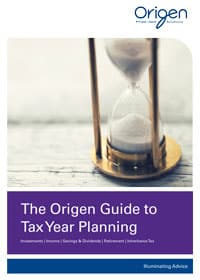As we approach the end of another tax year, you should take the time to check that you have made best use of the tax allowances available.
Any unused allowances can be lost – although you will have new allowances in the new tax year.
Tax free investing for you and the family
An ISA is one of the most tax efficient ways you can save for the future. You have an allowance of £20,000 per tax year. ISAs protect your investments from Income Tax and Capital Gains Tax.
You have until 5 April to use up any unused ISA allowance for this tax year. You can invest your ISA in a Stocks & Shares ISA, a Cash ISA or an Innovative Finance ISA. With low rates on Cash ISAs, if you are looking for more growth potential, please let us know.
Don’t forget that other family members also have their ISA allowance, so if you have used your full ISA allowance you can make ISA contributions on their behalf. Children have a Junior ISA allowance of £4,128 for this tax year (2017/18). The Lifetime ISA is available to people aged between 18 and 40 and offers a Government bonus of 25% when the funds are used for a first time property purchase or for retirement.
Saving for your retirement
Making pension contributions can offer attractive tax benefits as the contributions will receive tax relief. If you are a member of a company pension plan through auto-enrolment, you may also benefit from employer contributions.
You can get tax relief on personal pension contributions up to the greater of £3,600 or 100% of your earned income up to an annual allowance of £40,000. Tax relief may be given by:
- your employer who takes workplace pension contributions out of your pay before deducting Income Tax
- your pension provider who claims tax relief for you at a rate of 20% and adds it to your pension pot (‘relief at source’) so a contribution of £80 will be boosted to £100. You receive relief at source on all personal and stakeholder pensions, and some workplace pensions. If you are a higher or additional rate taxpayer you can reclaim further tax relief on your annual tax return.
Generally, everyone has an Annual Allowance for each tax year for pension contributions of 100% of relevant UK earnings up to a maximum of £40,000, but this allowance also includes any increase in value for any defined benefit workplace pensions, which are based on salary and service.
You should also remember that there is a maximum amount that can be accumulated in pension funds, Lifetime Allowance, which is currently set at £1million for the 2017/2018 tax year and if you exceed this you may incur additional tax charges.
Your annual allowance will be reduced if;
- you have already started to take flexible benefits from your pension fund, then your pension contributions allowance may be reduced to £4,000 in each tax year (Money Purchase Annual Allowance).
- you earn £150,000 or more, then your allowance will be reduced at the rate of £1 for every £2 over the £150,000. For example, if you earn £180,000 then your annual allowance will be £25,000 as you will lose £15,000 from the standard annual allowance.
Reducing your tax bill
Our Consultants can help you to review the savings, investments and policies which you have in place already. This review and analysis can help to address some key considerations including:
There are several ways that you can reduce your potential future tax bill:
Income Tax – Making pension contributions is an allowable reduction in your net income, so you can benefit from saving more towards your retirement and reducing your Income Tax bill.
Dividend Allowance – The tax-free allowance for dividends is falling from £5,000 to £2,000 so you should consider transferring dividend generating assets into a tax free investments such as an ISA, to avoid having to pay tax on dividends. Capital Gains Tax – If you are a higher rate taxpayer, you may consider transferring assets to your spouse/civil partner if they are a basic rate or non-taxpayer. Also, if you are likely to exceed your CGT allowance from cashing in gains, you should try to split the sale where possible across tax years so that you can utilise the CGT allowance in this tax year (£11,300) and the next tax year (£11,700) giving yourself an allowance of £23,000.
Inheritance Tax–Gifts from normal expenditure or up to £3,000 each year will be exempt from Inheritance Tax. Taking advantage of these allowances can help you to reduce the value of your estate and you can also use these gifts to fund ISAs or pension plans for family members.
Our consultants are experienced in many other tax friendly investments which may suit your circumstances. For example, Enterprise Investment Schemes and Venture Capital Trusts offer some Income Tax benefits or share investments on the Alternative Investment Market (AIM) can attract Inheritance Tax benefits. We can review your circumstances and recommend suitable actions for you to consider.

If you want to use some of these tax planning opportunities, you should contact your Origen consultant or take a look at ‘The Origen Guide to Tax Year Planning’.
Acting before the new tax year means that you can utilise double the allowance by using the allowances for this tax year and also the new tax year from April 6th.
This article is for information only and is not to be taken as Financial Advice. CA2130 Exp. 02/19












